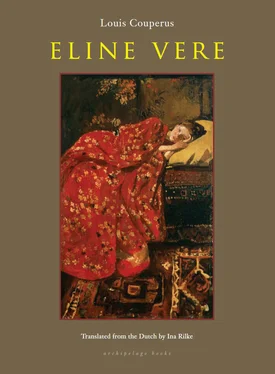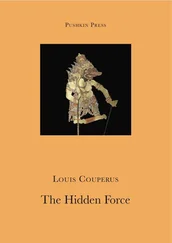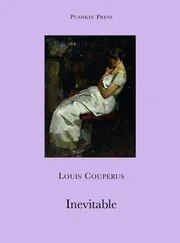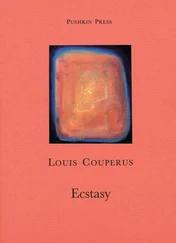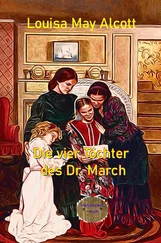She took up her phial to count out the drops.
One. . two. . three, four-five. The last two spilled out just as she righted the phial. Five. . would that be too much? She hesitated a moment. Those five drops would be enough to send her to sleep, of that she was certain.
She hesitated yet again. Abruptly, she made up her mind: yes, she would sleep. And she drank her potion.
. .
She lay down on the floor, close to the open door to the balcony.
Perspiring with fear, she felt herself sliding into numbness; but what a strange sensation it was this time. . how different from the numbness she had grown accustomed to.
‘Oh my God!’ she thought. ‘My God! My God! Could it have been. . too much?’
No, no, that would be too awful! Death was so black, so empty, so unspeakable! And yet, what if she had taken too much? All at once her fear melted away, and a sense of infinite peace came over her. If that was what she had done, so be it.
And she began to laugh, with stifled, nervous titters, while the numbness pressed down on her, as though with giant, leaden fists. She tried to ward off the fists with her flailing hands, and her fingers became entangled in the chain she wore about her neck. Oh, his portrait, Otto’s portrait!
Had she really taken too much? Would she. .? She shivered. Would they come knocking at her door in the morning, and find no answer? Would they return later and knock again, and come upon her lying on the floor like this?
A terrible thought! Her fingers, moist with perspiration, groped for the locket. They must not find that portrait on her breast!
She raised herself to a sitting position and prised the small oval card from its casing. She could not see it, because it had grown dark in her room and her vision was already clouding over; only the yellow glow of the street lamp by the entrance dispelled the gloom. But she imagined it vividly, and she fondled the slip of cardboard, pressing it to her lips again and again.
‘Oh, Otto!’ she faltered, her speech slurring. ‘It was only you, my Otto, not Vincent, not St Clare, only you. . you. . Otto. . oh my God!’
She was torn between fear of death and acquiescence. Then, in the passion of her kisses, she took the card in her mouth. Yes, she would swallow it, since she no longer had the strength to tear it up or destroy it in any other way! A shuddering sigh convulsed her frame, and she began to chew the rejected proof of Otto’s portrait.
. .
Her tears were still flowing, but she no longer sobbed. The bitterness had ebbed away, and she wept like a child, with soft, childish whimpers and plaintive little moans. Now and then she gave a short, crazed laugh, and at length grew quiet, seated on the floor by the open door to the balcony with her forearms crossed before her face.
She made no movement, petrified by the state she was in, by what lay in store. She had a sense of a sea tossing within her, a dark sea flooding her thoughts, drowning her; she wanted to push the sea away, but its force was too great, and she lurched over and fell, deafened by the dull roar in her ears and in her brain.
‘God! God! Oh God!’ she moaned in a choked, fading voice of powerless despair.
Then her consciousness seeped away, drop by drop, and the sleep of death came over her.
. .
The street lamp was extinguished, and the spacious room was transformed into a dark crypt, a mausoleum of blackness in which a lifeless body lay, ghostly white.
The night air grew chill, and slowly the pearl-grey pallor of dawn arose.
. .
Henk van Raat sent a letter at once to Daniel Vere in Brussels, notifying him of Eline’s decease. Uncle Daniel and Eliza both wrote back, full of sympathy for poor Eline. Daniel also informed him that Vincent had returned from Russia a few days previously, accompanied by the American friend whom Eline had met in Brussels, and that they would be travelling to The Hague to attend the funeral.
More than a year had passed since Eline’s death. For the Van Erlevoorts momentous changes had taken place. Madame van Erlevoort had been persuaded by her son Theodore to sell the house on the Voorhout, the beloved family home where all her children had been born, and she had moved to De Horze along with Mathilda and the four grandchildren. Paul and Frédérique were married and living in the small town of Heibeek, where Paul had been appointed mayor. Etienne had obtained his degree, and there had been talk of him making a career in the Indies, but his mother could not bear the thought of parting from her youngest boy, and in the end he had established himself as a lawyer in The Hague. Although Madame van Erlevoort was sad at first to lose her home in The Hague, she soon accommodated herself to the warmth and cosiness of her eldest son’s family circle, to which Henrietta, like Marianne before her, had returned from her last term at boarding school, while the boys put in an appearance from time to time. The Van Rijssel foursome — Tina was now eleven years old — were thriving alongside Memée in the wholesome country air.
Paul had begged his mother to follow Madame van Erlevoort’s example by selling her house and coming to live with him and Frédérique at Heibeek, but to no avail. Madame van Raat promised that she would visit them often, but she did not wish to take up residence in their home, fearing that her world-weariness, which had deepened since the death of her beloved Eline, would cast a pall on their sunny, fresh happiness. The excitement of Paul’s engagement and his subsequent marriage had taken her out of herself for a while, but now that her son had what he wanted and most needed, she gradually became submerged once more in the half-life of her listless despondence.
The Verstraeten household was hushed, and Marie often shed bitter tears. She had so much love locked away inside her, and all of it would go to waste; she felt as if she would shrivel up, like an overlooked flower. Lili was far too busy with her household and the care for her two fair-haired little ones to pay much attention to her, but she did not blame her sister for not realising how she unhappy she was. Besides, what difference would it have made, even if Lili had known; how could that have comforted her?
Paul and Freddie invited Marie to spend the summer months with them, and she felt better there than at home, for all that she doted on her papa and mama. At least with Paul and Freddie she could laugh and joke now and then, especially when they reminisced about all the fun they had had putting on those tableaux vivants in the old days. Fancy her having lectured Paul about being lazy! And did he and Freddie remember that Lili couldn’t abide De Woude back then? Well, Lili said it wasn’t true; she claimed that she had always adored him, and got very cross whenever anyone so much as hinted that this might not have been the case!
The villa in which Paul and Freddie had taken up residence was quite splendid. Built by the previous mayor of Heibeek, it had a colonial aspect to it, with a white-columned porch at the front and an enclosed veranda rather like a large conservatory at the back. Paul had furnished his new home with considerable luxury, which Frédérique thought somewhat exaggerated, given that it was a backwater they were living in where they received no one but the local church minister. But she did not go against her young husband’s extravagant tastes, in which she saw the reflection of unfulfilled artistic ambition; she was happy to see him the way he was now, with a warm heart for the community and contented in his position.
Otto came over from Elzen now and then to spend a few days with his sister and brother-in-law, and on a few occasions his visit coincided with that of Marie. Frédérique had the feeling that Marie was a shade subdued in Otto’s presence, and she was reminded with some unease of a remark she had made to her some years since.
Читать дальше
